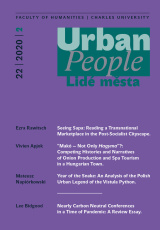“Makó — Not Only Hagyma”?
Competing Histories and Narratives of Onion Production and Spa Tourism in a Hungarian Town
DOI:
https://doi.org/10.14712/12128112.2348Klíčová slova:
locality, tourism, festivals, history, identity constructionAbstrakt
The aim of this paper is to present the role that onions and spa tourism play in local identity in the Hungarian town of Makó, as well as the possible explanations that cause the two phenomena to manifest differently in the local (urban and community) self-image. What the two phenomena have in common is the economic aspect, which in the past and in the present constitutes the main sector of the town, but we can see that this orientation is also perceived differently at many points. The question is relevant from an anthropological point of view because we can witness stacked layers of meaning that in some cases support or conflict with each other, and these affect both the self-image of the locals and the image of the town. The interpretive framework of the article is the theory of competing histories, incorporating concepts of tourism, festivals, identity, collective memory, and narrative research. The field of research is Makó, a small town in southeastern Hungary which is primarily known for its onion production but which a few years ago was also placed on the tourist map, on a national and international scale, in connection with the Hagymatikum Spa. This study seeks to answer the following questions: (1) what is the role of onions (agriculture) and spas (tourism) in the local identity of Makó; (2) how are the narratives of the two phenomena structured socially and historically; and (3) how are they intertwined in the endeavours of contemporary identity-construction? These questions are further interpreted through the theoretical framework of competing local histories and narratives that affect the construction of the local identity.
Stahování
Publikováno
Jak citovat
Číslo
Sekce
Licence
Copyright (c) 2022 Vivien Apjok

Tato práce je licencována pod Mezinárodní licencí Creative Commons Attribution 4.0 .


